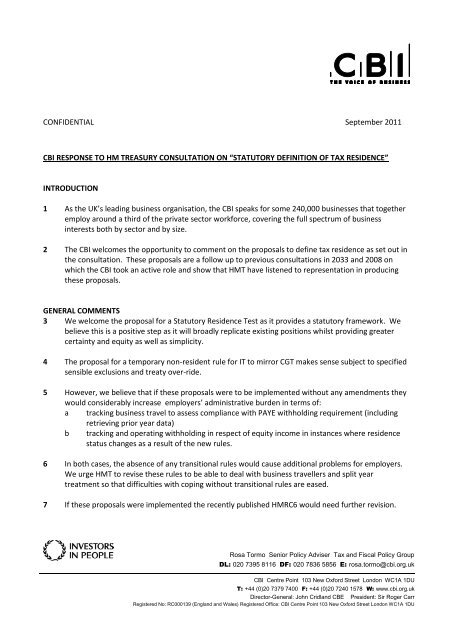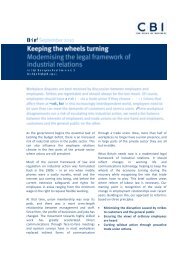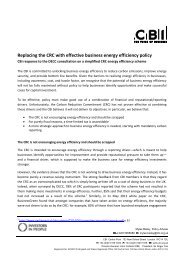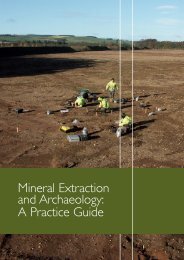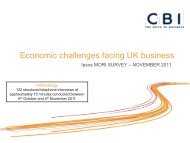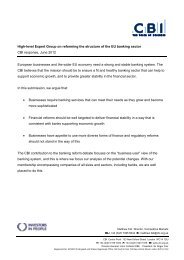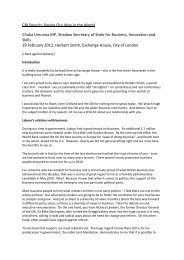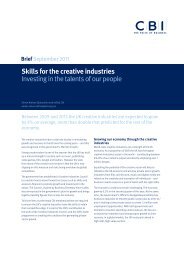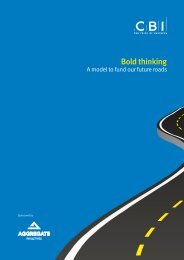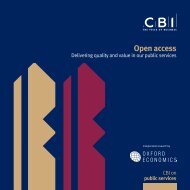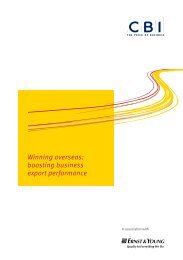Proposals for a Statutory Residence Test (pdf) - CBI
Proposals for a Statutory Residence Test (pdf) - CBI
Proposals for a Statutory Residence Test (pdf) - CBI
Create successful ePaper yourself
Turn your PDF publications into a flip-book with our unique Google optimized e-Paper software.
CONFIDENTIAL September 2011<strong>CBI</strong> RESPONSE TO HM TREASURY CONSULTATION ON “STATUTORY DEFINITION OF TAX RESIDENCE”INTRODUCTION1 As the UK’s leading business organisation, the <strong>CBI</strong> speaks <strong>for</strong> some 240,000 businesses that togetheremploy around a third of the private sector work<strong>for</strong>ce, covering the full spectrum of businessinterests both by sector and by size.2 The <strong>CBI</strong> welcomes the opportunity to comment on the proposals to define tax residence as set out inthe consultation. These proposals are a follow up to previous consultations in 2033 and 2008 onwhich the <strong>CBI</strong> took an active role and show that HMT have listened to representation in producingthese proposals.GENERAL COMMENTS3 We welcome the proposal <strong>for</strong> a <strong>Statutory</strong> <strong>Residence</strong> <strong>Test</strong> as it provides a statutory framework. Webelieve this is a positive step as it will broadly replicate existing positions whilst providing greatercertainty and equity as well as simplicity.4 The proposal <strong>for</strong> a temporary non-resident rule <strong>for</strong> IT to mirror CGT makes sense subject to specifiedsensible exclusions and treaty over-ride.5 However, we believe that if these proposals were to be implemented without any amendments theywould considerably increase employers’ administrative burden in terms of:a tracking business travel to assess compliance with PAYE withholding requirement (includingretrieving prior year data)b tracking and operating withholding in respect of equity income in instances where residencestatus changes as a result of the new rules.6 In both cases, the absence of any transitional rules would cause additional problems <strong>for</strong> employers.We urge HMT to revise these rules to be able to deal with business travellers and split yeartreatment so that difficulties with coping without transitional rules are eased.7 If these proposals were implemented the recently published HMRC6 would need further revision.Rosa Tormo Senior Policy Adviser Tax and Fiscal Policy GroupDL: 020 7395 8116 DF: 020 7836 5856 E: rosa.tormo@cbi.org.uk<strong>CBI</strong> Centre Point 103 New Ox<strong>for</strong>d Street London WC1A 1DUT: +44 (0)20 7379 7400 F: +44 (0)20 7240 1578 W: www.cbi.org.ukDirector-General: John Cridland CBE President: Sir Roger CarrRegistered No: RC000139 (England and Wales) Registered Office: <strong>CBI</strong> Centre Point 103 New Ox<strong>for</strong>d Street London WC1A 1DU
8 We welcome the fact that “exceptional circumstances” will be included in the test.9 There are, however, some issues of concern with these proposals. These are set out below.SPECIFIC COMMENTS10 We have some concerns with the following issues:abcFramework. These proposals are aimed mainly to individuals. Would they also apply to trusts?Short term assignments to the UK. There are concerns that it may be easier <strong>for</strong> short-termassignments/business travelers into the UK to become UK tax resident under the <strong>Statutory</strong><strong>Residence</strong> rules, particularly where they have previously been resident in the UK. This mayresult in a UK tax liability that did not exist previously. It may also result in a PAYE obligationunless Appendix 4 is amended to relax the withholding where individuals are resident in theUK.Outbound assignees from the UK. On a practical level we would expect fewer individuals torely on full time work abroad than is currently the case as they may not be certain of thenumber of workdays back in the UK at the time they leave the country. However this couldlead to individuals falling back on the Part C route to non-residence which could mean:i Greater difficulty to “break” UK tax residence, particularly <strong>for</strong> the first years ofassignments abroad.ii The split-year treatment not being availableIt could also lead to continued UK tax liabilities and increased costs <strong>for</strong> employers in respect oftheir expat populations (particularly where individuals are assigned to low or no tax countriesand where no <strong>for</strong>eign tax credit will be available in the UK).cWorkday relief. The proposed changes to how workday relief operates may restrict theavailability of this relief to inbound employees even though they might benefit from it withassignments <strong>for</strong> up to 5 years. The reliefs would be available <strong>for</strong> the year of arrival and thenext 2 years.If, as proposed, the relief would only apply whether the individual had been non-residentthroughout the 5 previous tax years, this would again increase assignments costs overall.On the other hand anyone working in the UK <strong>for</strong> a short period (eg 183 days) could loseordinary residence status <strong>for</strong> five years if they left the UK permanently and then returned.We are not happy with the proposal in paragraph 6.20 that overseas workdays relief shouldnot be available to UK domiciliaries and we are unclear whether this in accordance with EUlaw.dAbsence of transitional rules. The proposal is <strong>for</strong> these new rules to come into effect from6 th April 2012 without any transition period. Generally this should not present any difficulties,however in instances where an individual’s residence position (and potentially an employer’swithholding obligation) are affected by the changes, some <strong>for</strong>m of transitional rules may berequired, particularly short-term business travelers who have been resident in the UK within2
the past 2 years – we do not think it is reasonable to expect employers to have systems inplace to monitor prior year presence in the UK in such a short timeframe.Certain businesses charge costs to projects on the basis of projections. Those projectionswould include overseas workday relief which now might <strong>for</strong> certain individuals end on 6 April.ef3 hour working day. We welcome the clarification in the proposals that this is time workingand does not include lunch breaks or home to office travel. However we are uncertain aboutoffice to office travel and what records would be required to be kept by individuals to provethat they did not work more than 3 hours <strong>for</strong> the 3 working day test.Full-time working abroad. An individual working abroad would have to fulfil one of twocriteria to qualify as “working abroad full-time”. This would suggest that a combination ofemployments and self-employments or partnerships to make up a total of 35 hours per weekis not available.We would welcome HMT to confirm that a combination of hours totalling 35 hours per weekwould suffice.We are also concerned that the exemption <strong>for</strong> full time working abroad would not be flexibleenough <strong>for</strong> many commercial situations. There<strong>for</strong>e the objective in this Section would not beachieved. We envisage some problems:iFirstly, 20 days might not be sufficient. Would this mean, under the non-resident test(paragraph 3.17) that if someone who left the UK permanently after 20 workdays in theUK (eg 5 th May 2013) would be non-resident <strong>for</strong> that year?In large companies, secondees are typically at a relatively senior manager level and solikely to be required to make monthly (or perhaps more frequent) trips back to the UK.20 days is slightly less than 2 days per month. Would it be worth increasing this to 30days?iiSecondly, when does an individual s start working abroad when the contract starts orwhen first reporting <strong>for</strong> duty? For example if an individual left the UK on 31 March,turned up in Dubai on 1st April, got settled in <strong>for</strong> a week and then report <strong>for</strong> duty,he/she would have to work <strong>for</strong> two years to get a complete tax year - as the duties "atthe workplace" start 8th April. Would it be assumed that the individual would beworking even when he/she were settling in as the employer was paying you?In response to Question 1 in the Consultation Document we think that the legislation shouldpermit those who could not leave the UK <strong>for</strong> reasons beyond their control to remainconclusively not-resident if they left as soon as they could, <strong>for</strong> example in circumstances suchas ash clouds, hospitalisation, war, industrial action preventing flights etc.The position of full time working abroad is still unclear when an individual leaves in one taxyear but starts work in the next tax year (paragraph 4.3).We hope these proposals would not make the Full Time Working Abroad test too stringentresulting in employees working abroad retaining their UK tax liabilities with increasingemployment costs if these employees were equalised.3
ghDefinition of “home”. We are pleased to note that the Treasury have admitted that morework is needed around the definition of “home”. The proposed conclusive residence testwould assume UK residence if an individual only had a UK home (paragraph 3.22). A definitionof “home” is there<strong>for</strong>e required so that temporary accommodation at a host location isincluded as a home (paragraph 4.12).Connection factors. We welcome the assurance from the Treasury that if an individual hasone connection factor at any time in the tax year it counts as a connecting factor.However, if one of the requirements <strong>for</strong> an “arriver” under “other connection factors” is tohave been non-resident in the previous 3 tax years, this could represent rather an onerous task<strong>for</strong> someone who had genuinely left the UK permanently but had been recalled within 3complete tax years.iFamily. If the only family is a spouse, there would be circumstances where the result mightdepend on knowing the residence status of the other person and/or whether they have a UKresident family. Is HM Treasury considering which spouse does the test begin with andwhether the other spouse should just be ignored?We believe it would make it too harsh <strong>for</strong> the accompanying spouse to have the sameconditions as the working spouse (paragraph 3.46).We find the rules <strong>for</strong> family and children as stated in paragraph 4.19 difficult to follow.So in paragraph 4.20 if a child is at boarding school <strong>for</strong>, say, 270 days a year he/she would beresident by definition.jkAccommodation. We welcome the proposal that it is not the intention to go back to the oldavailable accommodation test. There<strong>for</strong>e visiting family and staying say 2 weeks <strong>for</strong> Christmaswould not sufficient to give an individual residential accommodation.Split years. We welcome the assurance from HM Treasury that the intention of the proposal isnot to split year twice in one year ie non-resident/resident /non-resident.We also welcome the fact that HM Treasury are working on the interaction of the conclusivenon-resident tests and split years. For example, how would the conclusive factors and the splityear factors interact in cases when:An individual assigned to the UK on 1 st March <strong>for</strong> 2 ½ years (and had been non-resident<strong>for</strong> the past 3 years) and had not been to the UK be<strong>for</strong>e prior to arrival?An individual in the year of arrival had been in the UK <strong>for</strong> less than 45 days so would benon-resident?Paragraph 3.44 says that it would be treated as split if an individual starting full-timeemployment in the UK. Would the year then be split and applied roughly, say, 1/12 of 45 daysto the non-resident conclusive test or is this trumped by the conclusive non residence test?The Consultation Document does not make clear when would the split year ruling becomelegislation. It admits ESC’s A11, A78 and D2 would need to be converted to statute. Is so westrongly suggest this should be done from 6 April 2012.4
We think that the conditions <strong>for</strong> split year treatment in paragraph 3.44 are too harsh (thirdbullet point). Does it mean that a single trip back to the UK would deny ESC A11 unless anindividual were working full time abroad?5


